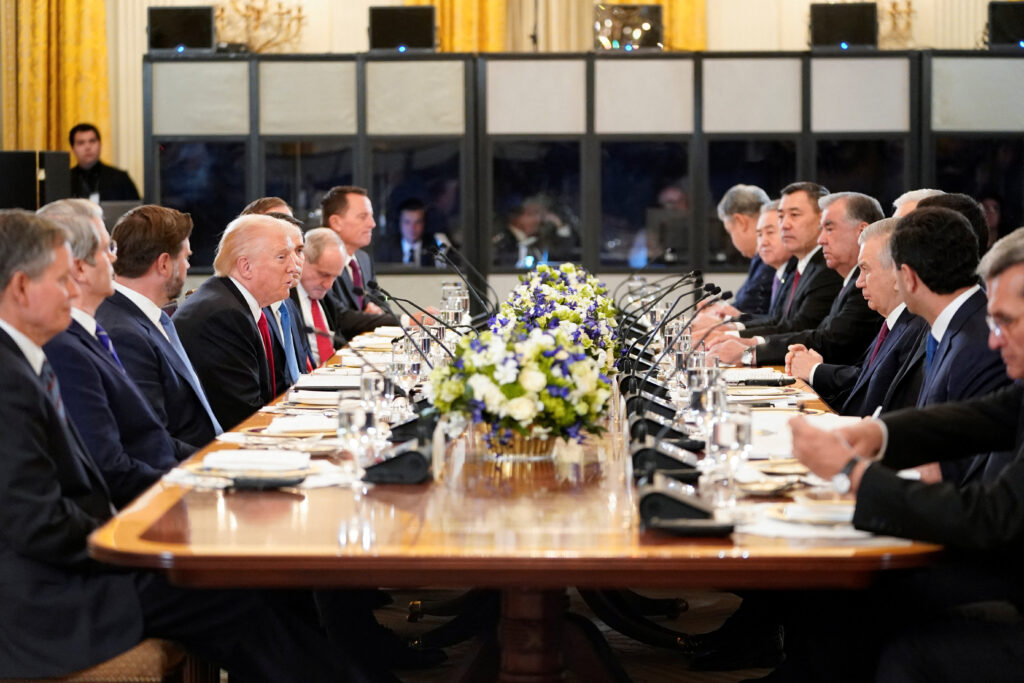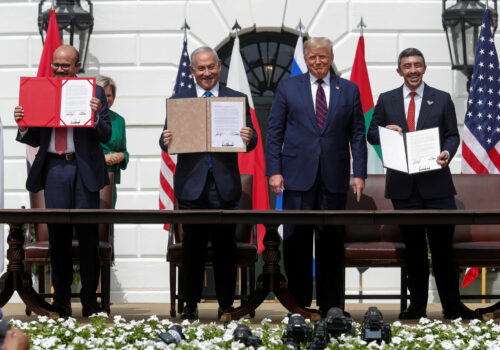Central Asia just became more central to US diplomacy. Kazakhstan will join the Abraham Accords, a diplomatic pact brokered by the United States in 2020 to normalize relations between Israel and several Muslim-majority nations. President Donald Trump announced the news in Washington, DC, on Thursday during the C5+1 summit, which Kazakh President Kassym Jomart-Tokayev and leaders from four other Central Asian states attended. How will this development impact Kazakhstan, Israel, and broader US diplomatic goals in the Middle East and Central Asia? We accorded our experts the opportunity to share their perspectives below.
Click to jump to an expert analysis:
Daniel B. Shapiro: This is no great breakthrough, but it holds some symbolic value
Sarah Zaaimi: A broader pan-Abrahamic bloc is forming
Andrew D’Anieri: Kazakhstan wants as many partners as it can get
Danny Citrinowicz: A failed attempt to revive the Abraham Accords “brand”
Nic Adams: Kazakhstan seizes an opportunity to partner with the US
Itai Melchior: Welcome to the Abraham Accords 2.0
This is no great breakthrough, but it holds some symbolic value
Kazakhstan has had diplomatic relations with Israel for thirty-three years, so the announcement that it is joining the Abraham Accords has a strange ring to it. (Morocco considered its own agreement with Israel as a reopening of ties launched in the 1990s, and as essentially separate from the Abraham Accords.) There is no breakthrough here, and perhaps little more than a Kazakh effort to curry favor with Trump.
But there is modest symbolic value in presenting momentum toward building a community of countries in and adjacent to the Middle East that seek to cooperate to advance shared interests. That was also the intention of the Negev Forum, established in 2022, which included the United States and Egypt, as well as Israel, the United Arab Emirates (UAE), Bahrain, and Morocco. As an initiative of the Bennett-Lapid government and the Biden administration, it apparently holds little interest for either Trump or Israeli Prime Minister Benjamin Netanyahu, hence the apparent attempt to reestablish a similar mechanism under an Abraham Accords heading. There is a risk of redundancy and confusion in establishing multiple overlapping venues for regional integration. But their success or failure will be measured by the practical cooperative projects that emerge in areas like trade, defense, health, energy, education, technology, and tourism that bring the benefits of regional integration to the citizens of participating countries.
—Daniel B. Shapiro is a distinguished fellow with the Scowcroft Middle East Security Initiative. He served as US ambassador to Israel from 2011 to 2017, and most recently as deputy assistant secretary of defense for the Middle East.
A broader pan-Abrahamic bloc is forming
Kazakhstan joining the Abraham Accords is proof that the future of the Accords transcends Arab-Israeli partnerships and historical rivalries inherited from the Israeli-Palestinian conflict. They have the potential to expand to other geostrategically influential and economically significant Muslim-majority countries in Asia, Africa, and Eurasia. As we recently witnessed in the Sharm El-Sheikh Gaza Peace Summit held in Egypt on October 13, other Muslim-majority nations such as Indonesia and Pakistan have a greater role to play in stabilizing the region and building a broader and more robust pan-Abrahamic bloc.
Kazakhstan is only the beginning. Many Turkic countries in the Caucasus and Central Asia, such as Azerbaijan and Uzbekistan, have also been showing interest in joining the Abraham Accords, as they have grown increasingly distant from the Russian and Iranian axis and closer to the United States, Israel, and their allies. Winning over key players such as Astana and Baku, with rich gas and uranium deposits and a location at the doors of the Caspian Sea, will provide the United States and Israel with a strategic edge over Russia and Iran in regions the latter traditionally viewed as their exclusive sphere of influence.
It is also essential for the Trump administration and Israel to position the Abraham Accords as the only framework for sustained regional peace and economic integration, rather than reinventing the wheel with newly constructed initiatives lacking symbolic depth, such as the “Board of Peace,” which was announced together with the twenty-point Gaza peace plan last month. Only a project grounded in the religious and historical symbolism of pan-Abrahamism can deliver a federating framework for Arab and Muslim-majority nations. The Accords have the potential at the symbolic and practical levels to offer Arab and Islamic populations, including the Kazakh people, an alternative paradigm for their future: one that is able to counter the Iranian axis of resistance and China’s “Silk Road” and “anti-hegemonic” rhetoric, and that is built on historical interconnectivities rather than simple realpolitik.
—Sarah Zaaimi is a nonresident senior fellow with the Atlantic Council’s Middle East Programs.
Kazakhstan wants as many partners as it can get
The announcement that Kazakhstan will join the Abraham Accords is significant mostly because it demonstrates Astana’s desire for strong relations with the United States and the Trump administration. Kazakhstan has long had normal relations with Israel, so joining the Accords is a positive step, but mostly a costless formality for the moderate Muslim country. Joining the Abraham Accords is a bow to Trump, who made the agreement the signature foreign policy achievement of his first term.
Sandwiched between Russia and China, Kazakhstan wants as many partners as it can get, and in particular Astana wants a more active relationship with the United States and Europe. Tokayev hopes that American firms will invest in Kazakhstan, especially in its vast mineral resources and high-tech industries. Joining the Abraham Accords is a smart pragmatic step to get positive attention from Washington to help catalyze more concrete economic interest in Kazakhstan from US government agencies and the private sector.
—Andrew D’Anieri is the associate director of the Atlantic Council’s Eurasia Center.
A failed attempt to revive the Abraham Accords “brand”
The announcement of Kazakhstan’s accession to the Abraham Accords raises many questions, especially since Israel and Kazakhstan already have diplomatic relations.
It is clear that the Trump administration is trying to kill two birds with one stone with this statement—to prove that the Abraham Accords “brand” is still alive (especially in preparation for the visit of the Saudi crown prince to Washington) and to poke a finger in the eye of Chinese ambitions in the Eurasian space.
But the truth is that without significant progress on the political track between the Palestinian Authority and Israel, Saudi Arabia will not join the Abraham Accords, regardless of the accession of other countries. And without Saudi Arabia, it is very unlikely that additional Muslim countries will join these agreements.
Therefore, the administration should invest effort in renewing the political dialogue between Israel and the Palestinians, as this is the only track that will ensure the expansion of these agreements.
—Danny Citrinowicz is a nonresident fellow with the Atlantic Council’s Middle East programs. He is also a fellow at the Institute for National Security Studies. He previously served for twenty-five years in Israel Defense Intelligence.
Kazakhstan seizes an opportunity to partner with the US
With Kazakhstan joining the Abraham Accords, the multilateral agreement has expanded from the Middle East and North Africa to Central Asia, bringing in the largest and most populous country in the region in what will likely be interpreted as a show of international support for Israel after the implementation of the Gaza cease-fire, as well as a shrewd political move to curry favor with the United States. The announcement was adeptly timed to take place during the C5+1 summit between the Central Asian states of Kazakhstan, Uzbekistan, Tajikistan, Turkmenistan, and Kyrgyzstan and the United States.
The Central Asian republics have long sought to diversify their partnerships following the end of the Cold War, a trend significantly accelerated after the Russian invasion of Ukraine. With Russia in many ways still the dominant actor in the region, Central Asian states have looked for opportunities to partner with the United States and others in areas such as trade and security. Given that Kazakhstan has long recognized Israel and has maintained a diplomatic presence there since almost immediately after gaining independence from the Soviet Union, the move to join the Abraham Accords was likely more strategic in nature, signaling support to US diplomatic initiatives to gain goodwill in Washington. For Israel, it’s an opportunity to move forward from the war in Gaza through expanded international cooperation and diplomatic support.
—Nic Adams is a nonresident senior fellow with the Scowcroft Middle East Security Initiative at the Atlantic Council’s Middle East Programs. He most recently served as a professional staff member on the US Senate Select Committee on Intelligence and as senior advisor to Senator John Cornyn (R-TX).
Welcome to the Abraham Accords 2.0
One of the less discussed outcomes of the Abraham Accords campaign is that for the first time in history, a majority of the member countries in the Organization for Islamic Cooperation (OIC) now have formal relations with Israel. As opposed to the Arab League, a regional organization founded in 1945 with twenty-two member states, the OIC, founded in 1969, has fifty-seven member states from four continents. And not all of them are Muslim-majority countries. The OIC claims to be the collective voice of the Muslim world, and it endeavors to safeguard and protect the interests of the Muslim world in the spirit of promoting international peace and harmony.
In today’s world, where alliances and blocs are formed and reshaped, there is an opportunity to turn the Abraham Accords from a formal statement of recognition of Israel and promotion of normalization and peace, into a regional bloc with mutual economic and political interests. This bloc will contain the United States, Israel, all OIC countries that have relations with Israel, and any other country that would like to be join. This will serve several benefits:
- It would make the Abraham Accords a bigger and more significant bloc, which will make it easier for leaders of countries that do not yet have ties to Israel to justify their decision to join it.
- It will create an alliance with a stronger link to the United States.
- It will become a significant trading bloc.
- It will create an anti-radical bloc at the United Nations.
- It can help promote the India-Middle East-Europe Economic Corridor (IMEC), a trade, energy, and data highway.
Kazakhstan joining the Abraham Accords could be the first step in such a program. To succeed in this, a formal secretariat should be established, and an official invitation should be sent to all OIC member states to join.
—Itai Melchior is a nonresident senior fellow with the N7 Initiative at the Atlantic Council’s Middle East Programs. He previously served in the Office of the Israeli Prime Minister as deputy director of the Ministry of External Affairs and Special Liaisons Directorate within Israel’s National Security Council.
Watch below for more expert analysis
Further reading
Mon, May 12, 2025
Azerbaijan and Kazakhstan are the Abraham Accords’ new frontier
MENASource By
Joining the Accords could benefit Baku and Astana, while also helping Israel and the US strengthen engagement with the Turkic world.
Thu, Jul 17, 2025
Five years on, the Abraham Accords need a multilateral mission
MENASource By
As the Trump administration pushes for “commerce, not chaos” in the region, the Abraham Accords ideology is the most powerful tool to achieve that goal.
Wed, Oct 15, 2025
Twenty questions (and expert answers) about the next phase of an Israel-Hamas deal
New Atlanticist By
What will follow part one of the cease-fire deal brokered by the Trump administration? Atlantic Council experts share their answers.
Image: US President Donald Trump attends a dinner with the leaders of the C5+1Central Asian countries of Kazakhstan, Kyrgyzstan, Tajikistan, Turkmenistan, and Uzbekistan, in the East Room of the White House in Washington, DC, US, November 6, 2025. REUTERS/Nathan Howard




